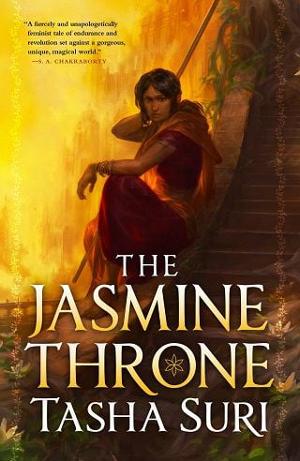Chapter 44: Rao
RAO
They waited at the bower of bones for a long, long time in the dark of the moon. They waited as Hiranaprastha began to glow with festival lights, which grew bright enough for the glow to be visible even through the dense forest. They waited as dawn approached, rosy-fingered, for Malini to come.
Rao had promised to wait through the night for Malini, and he did so, along with Lata and Prem and all of Prem’s men. Day came. The city continued to flicker, alight with both sun and flame. Surely the festival was over? But Rao knew nothing of Ahiranyi traditions. He couldn’t be sure.
He kept on waiting.
The men were restless. One of the messengers in Prem’s service—a man used to traveling across swathes of the empire—entertained the others by telling them about the strange nature of the seeker’s path.
“Srugna lies beyond the woods, on every map. It’s a long journey, usually. Weeks. But Ahiranyi’s forest doesn’t always obey normal rules, and on the seeker’s path time moves differently,” the messenger told them.
“Differently?” another man asked, clearly skeptical.
The messenger shrugged. “All I can tell you is that if you travel this path, you’ll make it to Srugna in days, not weeks. The locals say the yaksa built it. For all I know, they did.”
“Does it demand a price?”
Rao and the others turned. Lata was standing back, in shadow beneath the trees. He couldn’t quite make out her expression.
“I don’t know what you mean,” said the messenger.
“No tale would claim yaksa are inherently benevolent beings,” said Lata. “Not even to their own people. If they have made a path, if that path still exists long after their demise—I have no doubt that the magic of it is a double-edged sword.”
“Well, it’s not a safe path,” the messenger said thoughtfully. “Sometimes people go missing along it. Or turn up dead. But that’s no different from traveling the woods the normal way. You could just as easily be shot by a poacher or eaten by some wild animal.”
“Did you last travel it alone?”
The messenger shook his head.
“And how many of you made it to the other end?”
“That isn’t important.” Prem interrupted firmly. “We’re going the swift way, like it or not.” His voice held nothing of its usual languorous gentleness. It was a voice that brooked no argument. “We’ve stayed in Ahiranya far too long.”
There was a noise from behind Lata. One of the men who’d been on watch appeared, his expression grim.
“The city’s on fire,” he said.
“What do you mean, on fire?” Prem barked.
“I don’t know,” the guard said helplessly. “I went near to the edge of the forest and, my lord, the smoke isn’t from the festival lights. It’s something far bigger.”
Alarmed, Prem and Rao went to look for themselves. The smoke from the city was beginning to billow into the forest. From here, it was difficult to tell the cause. But Rao could smell burning wood and the distinct, cooked char of flesh on the air. He covered his nose, staggered that he had not smelled it sooner, or felt the sheer heat of the blaze.
Ahiranya’s forest did not obey normal rules. Somehow, the forest’s strangeness had muted the worst of it until they had stepped nearer to its borders.
“Someone needs to be sent back to find out what’s happening,” Rao told Prem.
Prem crossed his arms. “I think we should head directly to Srugna,” he said. “As fast as possible.”
“There are Parijatdvipans down there, and we need to know what’s become of them,” said Rao grimly. “We need to know what kind of dangers we’re leaving at our back.”
The guard who had been on watch volunteered to go.
“If there’s any trouble at all, you come straight back,” Prem told him. “You understand?”
“Yes, my lord,” the man said. He bowed his head, then straightened, adjusting the whip at his waist. “I won’t be long.”
“No more than an hour, or we’ll have to leave you behind.”
“My lord,” agreed the man, and then he bowed once more and strode off.
Rao slumped against a tree, rubbing his forehead. Prem joined him, sitting on the ground by his side with a wince.
“Are you hurt?” Rao asked.
“Me? No. Besides, Rao, I’m more interested in talking about you.”
Rao looked at him. Prem offered him a lopsided smile.
“So much yearning,” Prem murmured. “I don’t think I’ve ever felt like you do.”
“I’m not in love with Princess Malini,” said Rao. “That isn’t why I’ve waited here.”
Prem snorted in disbelief. “Whatever you say.”
“Prem. She was my sister’s closest friend.”
“Are you telling me you’ve left your family behind, hid here under an assumed identity, consorted with Ahiranyi, and refused to leave with me, because you think of her as a sister?”
“No! No.” Rao took a deep breath. “I’m here because I know Aditya.” He lowered his voice to a whisper. “He needs her.”
Prem was silent for a moment. His smile turned into something more thoughtful. “He’s managed to gain plenty of followers without her.”
“Has he? I was there when he chose to leave,” said Rao. “When he decided to become a priest—to abandon the role of crown prince and choose another way.”
“And now he’s seen the error of his ways.”
“I was there,” Rao pressed on, voice as low as he could make it, “when Malini wrote him letter after letter, convincing him to take up his birthright again. I was there when she convinced lord after lord, warrior and prince and king, to join her brother’s cause. I was there when… when she stood before the court and called Chandra a false emperor on a stolen throne and proclaimed that she spoke for the mothers of flame. When she promised he would fall.”
“You put too much weight on her dramatics,” said Prem, eventually. “Those lords and kings have good reason not to want Chandra on the imperial throne. They would have turned to Aditya without her.”
“I’m not so sure. Aditya removed himself from politics. Perhaps some would have sought him out. But the power that’s amassed around him… She saw a weakness, a need, and she took advantage of it. She gave him this. And without her—”
“He’ll be fine.”
You still think I love her, thought Rao. “Without her,” he continued, quietly, “he won’t know what to do. I was raised alongside him, Prem. I was his companion, one of his closest lords from boyhood. I know.”
Prem glanced at him. But all he said was, “Someone’s coming.”
Rao heard it then: the clatter of hooves. The swish of metal against metal, sabers drawn from sheaths. Prem gave a low whistle, and a moment later his own men appeared in the trees behind him.
There was a distant, frightened whinny of horses. The noise of men dismounting. Beasts of burden were too frightened of the forest to enter it. The Ahiranyi knew that. Even Rao knew that. But the men approaching were dragging their wild-eyed mounts with them, apparently on the orders of a man shouting from behind them.
“We should go,” Rao murmured.
“I thought you were the one who wanted to know the dangers at our back,” Prem whispered in return. His gaze was fixed forward, mouth barely moving. “Well. Now we’ll know.”
After a moment, ten figures appeared in their line of sight. A contingent of soldiers, dressed in Parijati white and gold. Prem’s man, who’d gone into the city, was at the forefront. There was a saber to his throat.
Immediately, Rao reached for a chakram at his wrist. Around him, Prem’s men touched hands to their whips. The ones at the back, nearly in the shadow of the seeker’s path, reached for their bows. Behind them, Lata sank back deeper into the gloom, seeking cover.
“Ah. There’s no need for that. Lower your weapons,” a voice said. The figure stepped forward, and Prem swore, unraveling his whip from his belt in a slithering hiss of steel.
“Santosh.”
“We went to collect you from your whoring, Prince Prem,” said Lord Santosh, eyes glittering. “And you, Prince Rao,” he added, bowing his head in a mockery of respect. “Although I expected to find a Lord Rajan. What a pleasant surprise, to find you instead! The brothel burned down, unfortunately. And you weren’t there.”
“Let my guard go, Santosh,” Prem demanded. “Or you’ll be committing a crime against the royal blood of Saketa.”
“I act in the emperor’s name,” Santosh snapped in return. “I protect his interests. And it has occurred to me that it’s curious for a low prince to spend so long in Ahiranya just when the emperor’s sister happens to be here, imprisoned. Very curious.”
“I told you,” Prem said, baring his teeth into something that vaguely approximated a smile. “I came to Ahiranya for pleasure.”
“And you, Prince Rao? For pleasure alone?”
“What do you want?” Rao asked bluntly. The Saketan man was blinking hard, obviously terrified, struggling to breathe around the press of the blade, and Rao suddenly found he had no patience for games. “For the boy’s life.”
“I want to know why you’re here,” Santosh said. “I want to know where you’re going. I want to know who you’re working with against our emperor.”
“I’m afraid you don’t have the authority for such invasive questioning, Lord Santosh,” Prem said. “Let me explain it to you, since you strike me as particularly slow: You’re nothing but an inbred Parijati lord who loves licking the sweat off Chandra’s feet. We, on the other hand, are royal-blooded sons of the city-states of Parijatdvipa. You are not our equal. Unless Chandra has already handed you Ahiranya’s regency?”
“I am an advisor to the emperor,” Santosh said through gritted teeth.
“All our ancestors, since the Age of Flowers, have been advisors to emperors,” Prem countered, gesturing to himself and Rao. “Our kin are the emperor’s counselors and have always, always placed their blood and their hearts in the service of the whole. You’re nothing but a lackey.”
“You don’t deserve to serve him,” Santosh said, a hectic light in his eyes as he drew his own saber. “You’ve been given too much freedom. It was Parijat that saved your people and Parijati blood that should stand first. Your betrayal only proves it. He is far superior to you.”
“He isn’t your friend,” Prem goaded. “You know that, don’t you?” He tsked. “Poor dove. I can see that you don’t.”
“I’ll peel your skin off your bones, low prince.”
“Grand talk. Come closer, if you mean it.”
Together, Rao and Prem took a step back, and another, moving deeper into the seeker’s path. The air rippled strangely around them. They saw the hesitation in the eyes of the Parijati soldiers, who clearly feared the odd stillness of the forest and remembered the horrifying tales they’d been told about Ahiranya as children.
“Go back the way you came,” Prem called out. “Go squat on the regent’s throne. It’s clearly where you want to be anyway. Or does Chandra need you to prove yourself first?”
“Speak,” Santosh commanded angrily. “Lower your weapons and tell me how you’ve betrayed the emperor, or your man dies.”
The Saketan boy was watching them.
“My men know their loyalties,” said Prem.
The boy closed his eyes. Jerked forward, yelling, as he tried to make a bid for freedom. The Parijati soldier holding him wrenched his saber back.
There was a burst of blood, and Prem’s man was dead.
In almost the same moment, a volley of arrows broke from behind them, responding to Prem’s command.
“Quick,” Rao said, as Prem’s hand lowered and the Parijati ducked, raising shields or arms—one receiving an arrow through the wrist for his trouble. “Into the forest. We can try to outrun them.”
“And lead them right to Aditya?” Prem said, incredulous. “Come on, Rao, if we stay and fight—”
“We die,” said Rao.
“I’m not afraid of death,” Prem said.
“Maybe not,” Rao replied. “But you’d like to win, wouldn’t you?”
Prem hesitated.
“Trust me, Prem. They don’t know the terrain. We have a guide. They won’t know what to expect in there. I have a plan—”
“Whatever you’re thinking,” Lata yelled, with more volume than Rao had ever heard from her before, “hurry up!”
“I’m trusting you,” Prem said roughly. And with another gesture, a sharp whistle, his men were turning down the seeker’s path.
The Parijati, overcoming their hesitation, took hold of their horses and followed them.
 Fullepub
Fullepub 



